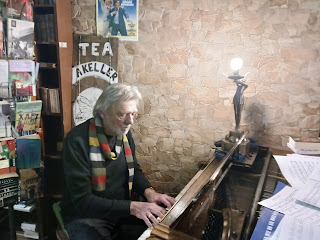Günther - Virtuoso
The person introduced here is probably the most special in this series for me, as we had only met in person once before the interview. Günther regularly plays the piano in a second-hand bookshop in Salzburg, as you can see from the title of this text. One day last fall, I visited this bookstore with a friend and became aware of the older gentleman who was tapping the keys with great motivation. A few hours later, we left this place that seems to have fallen out of time and literally swallows you up, and I knew I wanted to write down this person's stories. And that's what happened.
Günther also regularly sits at the piano in the Hotel Bristol as a musician and plays pieces of music that set him apart. Although he is a Mozarteum graduate, my interviewee is not a fan of classical music. On the contrary, for him, limiting himself to Mozart or Bach means restricting his mind and disregarding other musical genres, which are often just as or even more complex. The "piano man" prefers to play blues, boogie, rock 'n' roll, jazz or soul.
The first memory he tells me about is May 8, 1945: the end of the war after the Second World War. "My parents hung the white flag out of the window, the Americans came with the tanks, someone sat on it and shook my hand on the first floor." Günther tells me, and I am impressed.
He really learned to play the piano as a child near Braunau in the post-war period from a black American occupying soldier from New Orleans. According to Günther, this was one of the most formative people in his life, one of the few members of the military who asked permission in any situation. Before this soldier, Günther played the organ for the Catholic Church. In his life, he went through many different phases that seem extreme today, for example, his parents were taken away as communists, after which an elderly Russian woman took care of Günther.
In the 1950s, things like electricity and sufficient food were not a matter of course for a child in Central Europe.School fees, pensions and health insurance were also not available to everyone back then.Günther describes himself as a fighter; he says you need courage and a reason to resist. As a member of the '68 generation, he rebelled against the Nazi attitudes of many of his parents, as evidenced by the songs of those years, which he plays for me on the piano (A whiter shade of pale - Procol Harum or Rock around the block by Bill Haley).
1972 was the biggest demonstration of all time in Salzburg, in which Günther naturally took part. The then US President Nixon was due to meet with Bruno Kreisky, but because of the Vietnam War, the left-wing student movement prevented Nixon from landing at the airport in neutral Austria. 4000 people sat down on the landing field of the airport. In his younger years, Günther also took part in the so-called anti-festivals in Salzburg, which were organized by an Austrian Jew. The organizer was also involved in jazz; art was a strong political issue in those years, which often led to physical confrontations with the police. There were also powerful supporters of the opposing political side who kicked Günther out of the ranks of the Vienna Boys' Choir, for example. Günther tells me that he was never able to write songs himself, but always played music with his heart, even on a Russian cruise ship for a few years, once with his band at the opening of the ski race in Ischgl.
He tells us that we should dare to listen to and play music outside the canon. Still carrying his songs in my heart, I think back to our extraordinary conversation and thank fate for revealing his stories to me.





Kommentare
Kommentar veröffentlichen